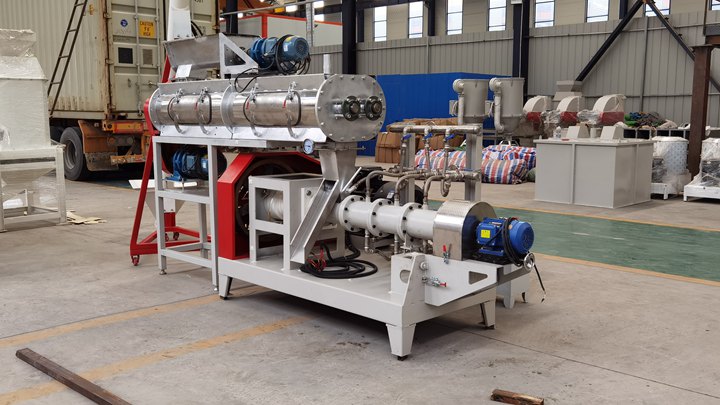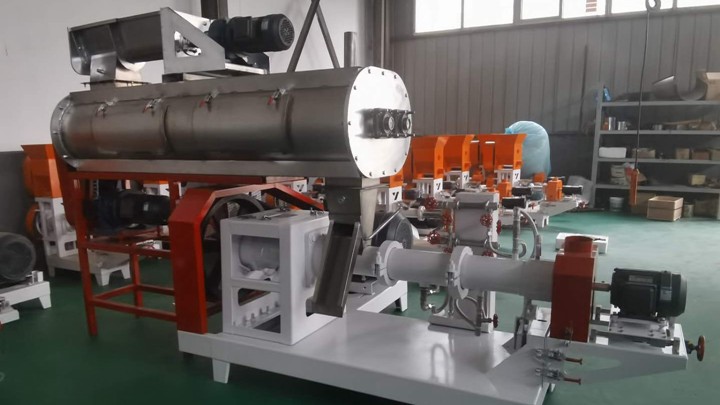
Floating Fish Feed Manufacturing Process. Selection of Raw Material. When selecting raw materials for fish feed processing, remember that the final product must be stable in water. The main nutrients are starch, with 10% to 15% of feed for sunken fish and over 20% of feed for floating fish. The starch content is generally between 5% and 60%.
.jpg)
Our state-of-the-art manufacturing plants, equipped with quality assurance labs and research and . development centre, help in developing nutritionally balanced and scientifically formulated products. ... We offer floating and sinking feed for all stages and types of culture. Aqua Health Center.
.jpg)
Compared with other feed manufacturing technologies, extruded processing technique of fish feed plant has unparalleted superiority in making fish feed pellets. ... According to the diverse eating habits of different type fishes, feed should have properties – floating, slow floating or sinking, and keep stability in water for certain time so ...
.jpg)
In preparing diets, preferential use of marine fish is suggested to minimize thiaminase activity, and raw fish could be steamed or poached. Lipids. Oils from marine fish, such as menhaden, and vegetable oils from canola, sunflower, and linseed, are common sources of lipids in fish feeds. Carbohydrates.

Ronald W. Hardy, Andreas Brezas, in Fish Nutrition (Fourth Edition), 2022 9.5.1.2 Fingerling feeds. Fish feed formulations for fingerling fish differ from fry feeds mainly in the dietary protein level, which is typically lowered by 12%–15% in feeds for fish once they reach 1–2 g.From this weight until fish reach 10–25 g depending on species, they are fed fingerling …
.jpg)
2022-3-22·Carp feed fourmulation. Carp fish eats aquatic phytoplankton and zooplankton in ponds. Carp fish also takes concentrate feed. The Carp fish diet requires 24-25% protein, 4-5% fat, and 3000 kcal/kg energy. Below is …
.jpg)
2021-5-1·The deployment of floating solar photovoltaic arrays (floatovoltaics) in freshwater environments has risen exponentially, and now installations are beginning to appear at sea (SERIS, 2019).Marine demonstrations have occurred in shallow tropical lagoons (Maldives), deep, protected fjords (Norway), the rough North Sea (The …
.jpg)
2021-11-8·Non-dry feeds-are divided into two major categories - Wet and moist.•Wet feeds-as those which are made entirely or almost entirely from high moisture ingredients, such as 'trash' fish, waste slaughterhouse products, undried forage, etc. •Moisture contents of about 45-70% Moist feeds-are made from mixtures of Wet, or moist and dry raw …
.jpg)
2017-8-3·MASS MORTALITY OF FISHES IN ENNORE ESTUARY Figure 2: Dead fishes found floating and deposited along the northern side of Ennore estuary. Physiochemical analysis of various parameters showed that temperature of water ranged from 32.0 to 38.6˚C, salinity between 17.5 to 36.45 psu and dissolved oxygen from 4.5 to …
.jpg)
Floating Fish Feed Manufacturing Process. Selection of Raw Material. When selecting raw materials for fish feed processing, remember that the final product must be stable in water. The main nutrients are starch, with 10% to 15% of feed for sunken fish and over 20% of feed for floating fish. The starch content is generally between 5% and 60%.
.jpg)
2021-2-17·Diet costs were reported to be Yuan 2.5/kg and Yuan 1.5/kg for the starter and production diets, respectively. Fish are fed by hand using a fixed feeding rate; fry 5–8% body weight/day, 4–5 feedings/day; fingerlings 5% body weight/day, 3– 4 feedings/day; production/broodstock 1–3% body weight/day, 2–3 feedings/day.
.jpg)
Publication Publication Date Title. KR970005084A 1997-02-19 Manufacturing method of floating fish feed after sinking. US4732775A 1988-03-22 Processes and appparatus for producing extruded foods. US4418086A 1983-11-29 Expanded textured protein product and method for making same.
.jpg)
Ronald W. Hardy, Andreas Brezas, in Fish Nutrition (Fourth Edition), 2022 9.5.1.2 Fingerling feeds. Fish feed formulations for fingerling fish differ from fry feeds mainly in the dietary protein level, which is typically lowered by 12%–15% in feeds for fish once they reach 1–2 g.From this weight until fish reach 10–25 g depending on species, they are fed fingerling …
.jpg)
2021-11-8·Non-dry feeds-are divided into two major categories - Wet and moist.•Wet feeds-as those which are made entirely or almost entirely from high moisture ingredients, such as 'trash' fish, waste slaughterhouse products, undried forage, etc. •Moisture contents of about 45-70% Moist feeds-are made from mixtures of Wet, or moist and dry raw …
.jpg)
2023-2-10·Feature Papers represent the most advanced research with significant potential for high impact in the field. Feature Papers are submitted upon individual invitation or recommendation by the scientific editors and undergo peer review prior to publication.
.jpg)
2013-8-10·Cork is also non-toxic, making it suitable for feed pellets. Not digested by the fish, the cork binds to the feces and makes it float. According to Dr. Alexander Brinker, optimized removal of feces from the surface stream improves many aspects of system performance, including water quality, efficiency of filtration systems, fish growth and ...
.jpg)
2017-8-3·MASS MORTALITY OF FISHES IN ENNORE ESTUARY Figure 2: Dead fishes found floating and deposited along the northern side of Ennore estuary. Physiochemical analysis of various parameters showed that temperature of water ranged from 32.0 to 38.6˚C, salinity between 17.5 to 36.45 psu and dissolved oxygen from 4.5 to …